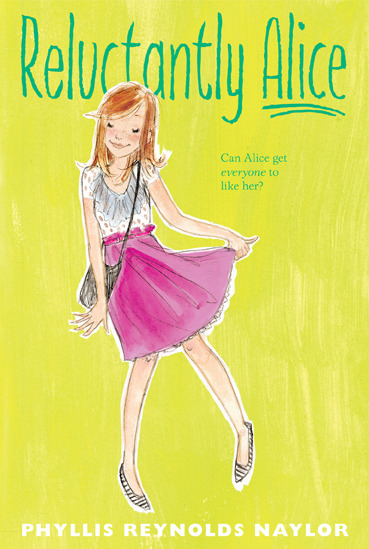“I realized that at this particular time in my life, I was friends with everybody. I’ll admit that seventh grade was only one day old, but suddenly I had this new goal: to go the whole year with everyone liking me. I don’t mean be “most popular girl” or anything; I just wanted teachers to smile when they said ‘Alice McKinley’ and the other kids to say, ‘Alice? Yeah, she’s okay. She’s neat.'”
In pursuit of a bit of preteen-Jessica lingering around in my psyche, I recently re-read a preteen-y book from my preteen days – Reluctantly Alice by Phyllis Reynolds Naylor.
Seventh-grade Alice has decided that all she wants out of middle school is to be likeable. Of course, Naylor obeys the first Law of a Decent Plot and immediately denies Alice her dearest want via a lumbering schoolyard named Denise Whitlock, but other than that Alice succeeds in making friends. Playing nice.
I don’t remember when I stopped playing that game, when it stopped seeming like an asset to play nice. I was thick in it in seventh grade, maybe all the way through high school, into college. My deepest pain was criticism because I was always always striving to please – all I wanted was to be liked, so why won’t you just like me already?
At some point after college, maybe in grad school, I read an article about how women send emails – that women are more likely to apologize in emails than men. That the apologies are usually needless – a pleasantry, a formality, a filler – that revealed a bit of that common need-to-please, that maybe made you look weak, unreliable, wishy-washy. I realized that I said “sorry” in almost every email I sent – sorry I didn’t have a chance to respond, sorry if you are too busy for this email, sorry for the trouble but I need xxx from you.
I stopped, because it seemed suddenly very clear that at any given time, there is likely something more important to me than feeling liked, being nice, having people say “Oh, Jessica? She’s okay. She’s neat.” That I should be looking out for my goals, my interests, and not apologizing so damn much.
But I still want to be nice. That doesn’t go away, and neither does the pain of criticism. And that’s part of why I love Alice, why I love YA and children’s lit; those identity struggles never truly go away, and for children and teens, the struggles are that much more raw and on the surface. Reading about that rawness reminds me that I am still raw, that I am grown up, but still in that struggle.
Maybe that’s not me anymore, but Seventh-Grade Jessica will always be a nice girl.

LOVE Alice!!! I never purposely tried to be nice in middle school… I was too afraid of bullies, so I tried to just blend in and go as unnoticed as possible. I had my core group of friends and was nice to them, but otherwise I was pretty quiet.
I definitely do the sorry thing. Except not just in emails – in face-to-face convos, too. I noticed it about a year or two ago, and had to consciously stop myself before I said it. Now I only say sorry if I’m actually apologizing for something. It’s such a small word, but it’s empowering to only say it when you *really* mean it.